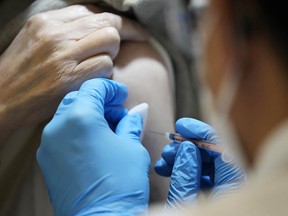Infection
COVID-19: 75% of Canadians were infected by virus by spring 2023
The rapid increase in infection rates, especially among younger adults, was fuelled by the now dominant Omicron variants
Article content
A surge in infections from the Omicron variant last respiratory virus season left three quarters of Canada’s population with immunity against SARS-CoV-2, the virus that causes COVID-19.
The data on infection-fuelled immunity — as opposed to vaccine protection — was produced by the COVID-19 Immunity Task Force (CITF) and published Monday in the Canadian Medical Association Journal.
Advertisement 2
Story continues below
Article content
Article content
It shows that by March of this year, after 16 months when Omicron was the dominant circulating strain, more than 75 per cent of people had been infected.
“Despite high vaccine coverage in Canada, the rate of infection rose rapidly with the highly contagious Omicron variant,” said Dr. Bruce Mazer, the study’s co-lead and a senior scientist at the Research Institute of the McGill University Health Centre.
“After six months with the Omicron variant circulating in Canada, in mid-June 2022, infection-acquired seroprevalence had risen to 47 per cent, with an average monthly increase of 6.4 per cent per month. It ultimately reached over 75 per cent by March 2023.”
-

Doctors, others warn of another triple epidemic in fall and winter
-

Vaughn Palmer: B.C. should do independent review of COVID response
That’s in stark contrast to earlier stages of the pandemic. During the first two phases, few people had evidence in their blood of a previous SARS-CoV-2 infection. There were less than 0.3 per cent infected by May 2020, and only nine per cent by November 2021. Those rates are in keeping with other high-income countries in North America and Europe.
Article content
Advertisement 3
Story continues below
Article content
Omicron combined with looser restrictions sparked the latest wave, especially among younger people.
“During Omicron, rates of infection-acquired immunity increased faster in younger age groups and in the western provinces of Manitoba, Saskatchewan, Alberta and British Columbia,” said study co-lead Dr. David Buckeridge, a professor of global health at McGill.
“By March 2023, roughly 80 per cent of adults aged 18-25 had evidence of a previous infection,” said Buckeridge in a release Monday. “That’s compared to approximately 75 per cent of those aged 25-39 years, 70 per cent of those aged 40-59 years, and 60 per cent of those 60 and over.”
Rates of infection have slowed significantly since the spring, though it continues to rise, especially among older adults.
B.C., like many Canadian jurisdictions, plans to roll out vaccines tailored to the latest Omicron variant in the fall. The CITF study authors say the data on infection rates should be used to watch for “variations by age and geography and the potential for waning antibody levels” in determining future public health policy surrounding COVID-19.
Advertisement 4
Story continues below
Article content
The CITF compiled the numbers along with seven collaborating teams of scientists. They used aggregate data to estimate trends in both infection-acquired and vaccine-induced SARS-CoV-2 presence in blood samples.
The numbers are from three distinct phases of the pandemic: pre-vaccination, from March to November 2020; during the rollout of vaccines, from December 2020 to November 2021; and during the Omicron waves, from December 2021 to March 2023.
The CITF, which is funded by the Public Health Agency of Canada, has supported 120 research studies focused on immunity to SARS-CoV-2, often among underrepresented populations and those living in long-term care.
Summer subscription sale: Our in-depth journalism is possible thanks to the support of our subscribers. For a limited time, you can get full online access to the Vancouver Sun and The Province, along with the National Post and 13 other Canadian news sites, for just $40 for one year or $1 a week for 52 weeks. Support our journalism by subscribing today: The Vancouver Sun | The Province.
For more health news and content around diseases, conditions, wellness, healthy living, drugs, treatments and more, head to Healthing.ca – a member of the Postmedia Network.




Comments
Postmedia is committed to maintaining a lively but civil forum for discussion and encourage all readers to share their views on our articles. Comments may take up to an hour for moderation before appearing on the site. We ask you to keep your comments relevant and respectful. We have enabled email notifications—you will now receive an email if you receive a reply to your comment, there is an update to a comment thread you follow or if a user you follow comments. Visit our Community Guidelines for more information and details on how to adjust your email settings.
Join the Conversation